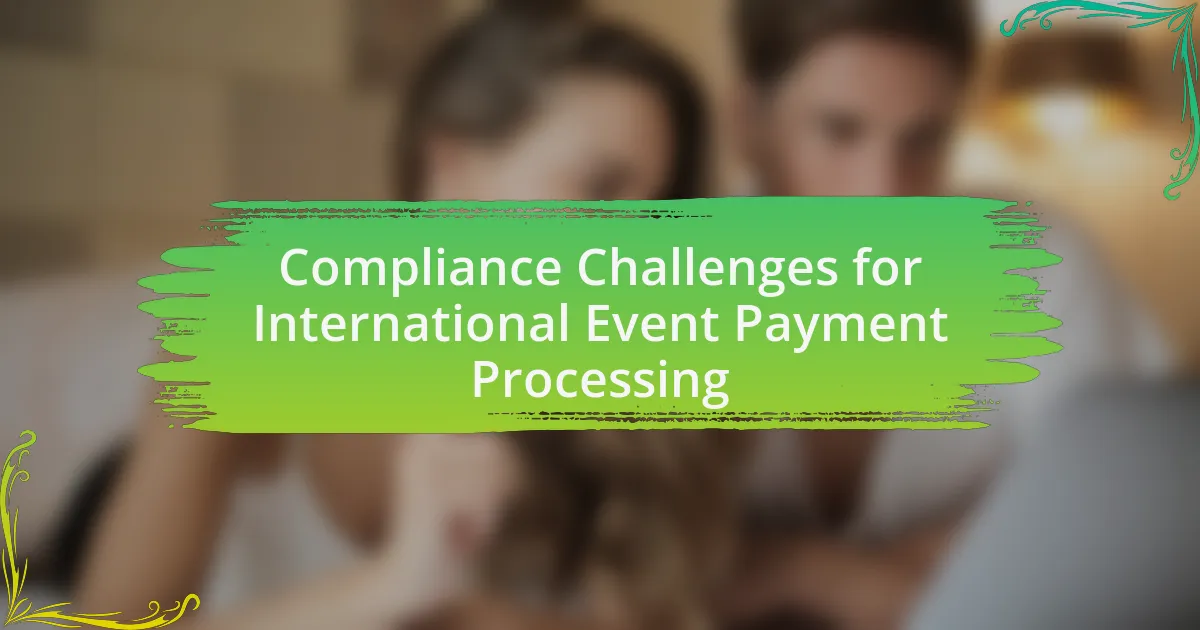The article focuses on the role of Know Your Customer (KYC) processes in event ticket sales, emphasizing their importance in verifying purchaser identities to prevent fraud and ensure regulatory compliance. It outlines how KYC impacts the ticket purchasing process, detailing key components such as customer identification, identity verification, and ongoing monitoring. The article also discusses the security enhancements KYC provides, the risks it mitigates for event organizers, and the challenges associated with its implementation, including data privacy concerns and costs. Additionally, it highlights the role of technology in streamlining KYC processes and explores future trends and best practices for effective KYC in the ticketing industry.
What is the Role of KYC in Event Ticket Sales?

The role of KYC (Know Your Customer) in event ticket sales is to verify the identity of purchasers to prevent fraud and ensure compliance with regulations. KYC processes help ticket sellers confirm that buyers are legitimate individuals, reducing the risk of ticket scalping and ensuring that tickets are sold to actual attendees. For instance, implementing KYC can lead to a decrease in fraudulent transactions, as evidenced by a report from the Event Ticketing Association, which noted that ticket fraud decreased by 30% in platforms that adopted KYC measures.
How does KYC impact the ticket purchasing process?
KYC, or Know Your Customer, significantly impacts the ticket purchasing process by ensuring that buyers are verified and legitimate, thereby reducing fraud and enhancing security. This verification process often requires customers to provide personal identification and proof of address, which helps event organizers confirm the identity of ticket purchasers. According to a report by the International Ticketing Association, implementing KYC measures can decrease ticket fraud by up to 30%, demonstrating its effectiveness in protecting both consumers and event organizers from fraudulent activities.
What are the key components of KYC in ticket sales?
The key components of KYC in ticket sales include customer identification, verification of identity, risk assessment, and ongoing monitoring. Customer identification involves collecting personal information such as name, address, and date of birth. Verification of identity ensures that the provided information is accurate, often through government-issued identification or other reliable documents. Risk assessment evaluates the potential risk associated with the customer, which may include analyzing purchasing behavior and transaction history. Ongoing monitoring involves continuously reviewing customer transactions to detect any suspicious activity, ensuring compliance with regulatory requirements. These components are essential for preventing fraud and ensuring the integrity of ticket sales.
How does KYC enhance security in ticket transactions?
KYC enhances security in ticket transactions by verifying the identity of buyers, which helps prevent fraud and unauthorized purchases. By requiring customers to provide personal information and documentation, KYC processes ensure that tickets are sold to legitimate individuals, reducing the risk of scalping and identity theft. For instance, a study by the International Ticketing Association found that implementing KYC measures can decrease fraudulent transactions by up to 30%, thereby increasing overall transaction security.
Why is KYC important for event organizers?
KYC, or Know Your Customer, is important for event organizers because it helps prevent fraud and ensures compliance with legal regulations. By verifying the identities of attendees, organizers can reduce the risk of ticket scalping, money laundering, and other illicit activities that can harm the event’s integrity. Additionally, KYC processes can enhance the overall security of the event, as organizers can track and manage attendee information more effectively. This is particularly crucial in large-scale events where the volume of transactions and attendees increases the potential for fraudulent activities.
What risks does KYC mitigate for event organizers?
KYC mitigates several risks for event organizers, primarily fraud, money laundering, and reputational damage. By verifying the identity of attendees, KYC processes help prevent fraudulent ticket purchases and ensure that funds are not derived from illegal activities. This verification reduces the likelihood of chargebacks and financial losses associated with fraudulent transactions. Additionally, KYC compliance protects the organizer’s reputation by demonstrating a commitment to regulatory standards and responsible event management, which can enhance trust among stakeholders and attendees.
How does KYC improve customer trust and satisfaction?
KYC, or Know Your Customer, improves customer trust and satisfaction by ensuring that businesses verify the identities of their clients, which enhances security and reduces fraud. When customers know that a company is taking steps to protect their personal information and financial transactions, they feel more secure in their interactions. This trust is further reinforced by the transparency that KYC processes provide, as customers are informed about how their data is used and protected. According to a study by the Association of Certified Financial Crime Specialists, 70% of consumers are more likely to engage with businesses that demonstrate a commitment to security through KYC practices. This increased trust leads to higher customer satisfaction, as clients feel valued and protected, ultimately fostering loyalty and repeat business.
What are the challenges associated with KYC in Event Ticket Sales?

The challenges associated with KYC in event ticket sales include data privacy concerns, the complexity of verifying identities, and the potential for increased costs. Data privacy concerns arise as ticket sellers must collect and store sensitive personal information, which can lead to compliance issues with regulations like GDPR. The complexity of verifying identities can hinder the sales process, as it requires robust systems to authenticate users effectively, often leading to delays. Additionally, implementing KYC processes can increase operational costs for ticket vendors, as they may need to invest in technology and personnel to manage compliance and verification tasks.
What obstacles do companies face when implementing KYC?
Companies face several obstacles when implementing Know Your Customer (KYC) processes, primarily including regulatory compliance, data privacy concerns, and technological challenges. Regulatory compliance requires companies to navigate complex legal frameworks that vary by jurisdiction, which can lead to inconsistencies in KYC practices. Data privacy concerns arise as companies must balance the need for customer information with the obligation to protect that data, often leading to apprehension about data breaches. Technological challenges include integrating KYC systems with existing infrastructure and ensuring that these systems can effectively verify customer identities without causing delays in the ticket sales process. These obstacles can hinder the efficiency and effectiveness of KYC implementation in event ticket sales.
How do privacy concerns affect KYC processes?
Privacy concerns significantly impact KYC processes by limiting the amount of personal information that individuals are willing to share. As consumers become increasingly aware of data breaches and misuse of personal data, they may resist providing sensitive information required for KYC compliance, such as identification documents and financial details. This reluctance can hinder organizations from effectively verifying identities, which is essential for preventing fraud and ensuring compliance with regulations. For instance, a survey by the International Association for Privacy Professionals found that 79% of consumers are concerned about how their personal data is used, which directly influences their participation in KYC processes. Consequently, businesses may need to implement more transparent data handling practices and alternative verification methods to address these privacy concerns while still fulfilling KYC requirements.
What are the costs associated with KYC compliance?
The costs associated with KYC compliance include direct expenses such as technology investments, personnel training, and ongoing monitoring systems. Organizations typically spend between $60,000 to $100,000 annually on KYC software and tools, while personnel costs can add another $50,000 to $150,000 depending on the size of the compliance team. Additionally, there are indirect costs related to potential fines for non-compliance, which can reach millions of dollars, as well as reputational damage that can affect revenue. According to a 2021 report by the Association of Certified Financial Crime Specialists, firms can incur an average of $1.5 million in fines annually due to KYC-related issues.
How can technology streamline KYC processes in ticket sales?
Technology can streamline KYC processes in ticket sales by automating identity verification and enhancing data management. Automated systems utilize artificial intelligence and machine learning algorithms to quickly analyze customer data, reducing the time required for manual checks. For instance, biometric verification methods, such as facial recognition, can confirm identities in real-time, ensuring compliance with regulations while improving user experience. Additionally, blockchain technology can securely store and share verified customer information, minimizing the risk of fraud and ensuring data integrity. According to a report by Deloitte, implementing such technologies can reduce KYC processing times by up to 80%, demonstrating their effectiveness in enhancing efficiency in ticket sales.
What role do digital identity verification tools play?
Digital identity verification tools play a crucial role in ensuring the authenticity of individuals during transactions, particularly in event ticket sales. These tools help prevent fraud by verifying the identity of buyers through methods such as biometric checks, document verification, and real-time identity checks. For instance, a study by the Identity Theft Resource Center found that identity verification processes can reduce fraudulent transactions by up to 80%. This significant reduction in fraud not only protects consumers but also enhances the overall integrity of the ticketing process, fostering trust between sellers and buyers.
How can machine learning enhance KYC efficiency?
Machine learning can enhance KYC efficiency by automating data verification processes and improving risk assessment accuracy. By utilizing algorithms that analyze vast amounts of data, machine learning systems can quickly identify discrepancies and flag potential fraud, significantly reducing the time required for manual checks. For instance, a study by Accenture found that implementing machine learning in KYC processes can reduce onboarding times by up to 80%, demonstrating its effectiveness in streamlining operations.
What best practices should be followed for effective KYC in Event Ticket Sales?

Effective KYC in event ticket sales requires implementing robust identity verification processes. This includes collecting comprehensive customer information such as name, address, and date of birth, which helps in accurately identifying ticket purchasers. Utilizing technology like biometric verification and document scanning enhances the reliability of the identity checks.
Additionally, integrating real-time monitoring systems can detect fraudulent activities by analyzing purchasing patterns and flagging suspicious transactions. Compliance with legal regulations, such as the Anti-Money Laundering (AML) guidelines, is crucial to ensure that KYC practices are not only effective but also lawful.
Research indicates that organizations employing stringent KYC measures experience a significant reduction in ticket fraud, thereby protecting revenue and maintaining customer trust.
What strategies can improve KYC compliance?
Implementing automated identity verification systems can significantly improve KYC compliance. These systems utilize advanced technologies such as artificial intelligence and machine learning to streamline the verification process, reducing human error and increasing efficiency. According to a report by the Financial Action Task Force, automated systems can enhance the accuracy of identity checks by up to 90%, thereby ensuring that organizations meet regulatory requirements more effectively. Additionally, regular training for staff on KYC regulations and best practices can further bolster compliance efforts, as informed employees are better equipped to identify and mitigate risks associated with customer onboarding.
How can organizations balance user experience with KYC requirements?
Organizations can balance user experience with KYC requirements by implementing streamlined verification processes that minimize friction while ensuring compliance. For instance, utilizing technology such as biometric verification or AI-driven identity checks can expedite the KYC process, allowing users to complete necessary checks quickly and efficiently. According to a report by the Financial Action Task Force, effective use of technology in KYC can reduce processing times by up to 80%, enhancing user satisfaction while maintaining regulatory standards.
What training is necessary for staff involved in KYC processes?
Staff involved in KYC processes require training in regulatory compliance, risk assessment, and customer due diligence. This training ensures that employees understand the legal requirements for identifying and verifying customer identities, recognizing suspicious activities, and implementing appropriate measures to mitigate risks associated with money laundering and fraud. According to the Financial Action Task Force (FATF), effective KYC training is essential for maintaining compliance with anti-money laundering (AML) regulations and enhancing the integrity of financial systems.
What are the future trends in KYC for Event Ticket Sales?
Future trends in KYC for event ticket sales include the increased use of biometric verification, enhanced data analytics, and integration of blockchain technology. Biometric verification, such as facial recognition and fingerprint scanning, is expected to streamline the identity verification process, making it faster and more secure. Enhanced data analytics will allow ticket sellers to better understand customer behavior and preferences, leading to more personalized experiences and improved fraud detection. Additionally, blockchain technology is anticipated to provide a transparent and tamper-proof method for tracking ticket ownership and transactions, reducing the risk of fraud and scalping. These trends are driven by the need for improved security and customer experience in the evolving landscape of event ticket sales.
How might regulations evolve regarding KYC in the ticketing industry?
Regulations regarding KYC in the ticketing industry are likely to evolve towards stricter compliance measures to combat fraud and enhance consumer protection. As ticket scalping and fraudulent sales have increased, regulatory bodies may implement more rigorous identity verification processes, requiring ticket sellers to collect and verify personal information from buyers. This evolution could be influenced by existing frameworks in financial services, where KYC practices are already well-established, leading to a potential standardization across industries. Additionally, the rise of digital ticketing platforms may prompt regulators to address data privacy concerns, ensuring that consumer information is securely handled while maintaining transparency in transactions.
What innovations are expected to shape KYC practices in the future?
Innovations expected to shape KYC practices in the future include the integration of artificial intelligence, blockchain technology, and biometric verification. Artificial intelligence enhances data analysis and risk assessment, allowing for more efficient customer verification processes. Blockchain technology offers secure and transparent record-keeping, which can streamline identity verification and reduce fraud. Biometric verification, such as facial recognition and fingerprint scanning, provides a more secure method of confirming identities, thereby improving the overall KYC process. These advancements are supported by industry trends indicating a shift towards more automated and secure KYC solutions, driven by regulatory demands and the need for enhanced customer experience.
What practical tips can enhance KYC implementation in ticket sales?
To enhance KYC implementation in ticket sales, organizations should adopt a multi-layered verification process that includes identity verification, document checks, and behavioral analysis. This approach ensures that the identity of the ticket purchaser is accurately confirmed, reducing the risk of fraud. For instance, utilizing biometric verification methods, such as facial recognition or fingerprint scanning, can significantly improve the accuracy of identity checks. Additionally, integrating machine learning algorithms to analyze purchasing patterns can help identify suspicious behavior, allowing for proactive measures against potential fraud. According to a report by the Financial Action Task Force, effective KYC practices can reduce fraudulent activities by up to 80%, highlighting the importance of robust verification processes in ticket sales.






